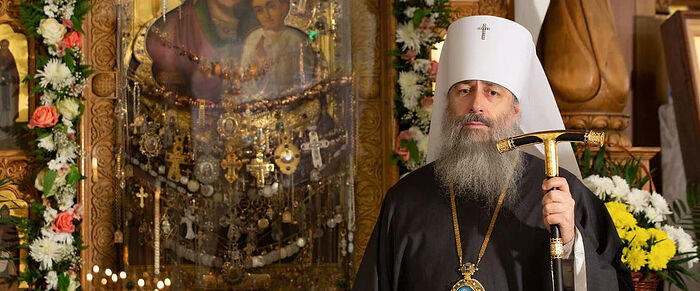For 15 years, I taught a course entitled “The Theology of God.” The students in that course were predominantly seminarians preparing for ministry, along with a number of lay students who were preparing to serve as ministers in various capacities in their churches.
I would always teach what the curriculum called for: the key biblical revelations about the nature of God and God’s actions in history, some salient perspectives from the patristics on God’s nature and actions, the historical development of the dogmatic definitions about God, plus some speculative notions on the Trinity, ranging from St. Augustine to Karl Rahner to Catherine Lacugna. But my overriding emphasis, like a leitmotif, was always this. I would tell the students: Whatever else you do in your pastoral practice and preaching, try not to make God look stupid!
Nothing is as important in our teaching, preaching, and pastoral activities as is the notion we convey of the God who underwrites it all. Every homily we preach, every catechetical or sacramental teaching we give, and every pastoral practice we engage in reflects the God who undergirds it. If our teaching is narrow and petty, we make God look narrow and petty. If our pastoral practice lacks understanding and compassion, we make God lack understanding and compassion. If we are legalistic, we make God legalistic. If we are tribal, nationalistic, or racist, we make God tribal, nationalistic, and racist. If we do things that befuddle common sense, we make God the enemy of common sense. Crassly stated, when we do stupid things in our ministry, we make God look stupid.
In all of our preaching, teaching, and pastoral practice we need to work at rescuing God from arbitrariness, narrowness, legalism, rigidity, racism, tribalism, nationalism, and everything that’s narrow, legalistic, and petty that, through us, gets associated with God. Anything we do in the name of God reflects God.
It’s no accident that atheism, anti-clericalism, and most of the negativity leveled against the Church and religion today can always point to some bad theology or Church practice on which to base itself. Atheism is always a parasite, feeding off bad religion. So too is most of the negativity toward the churches which is prevalent today. Anti-church attitudes feed on bad religion and thus we who preach, teach, and minister in the name of God need to scrutinize ourselves in the light of those criticisms.
As well, we need the honesty to admit that we have seriously hurt many persons by the rigidity of some of our pastoral practices that do not reflect a God of understanding, compassion, and intelligence, but instead suggest that God is arbitrary, legalistic, and not very intelligent.
I say this in sympathy. It’s not easy to reflect God adequately, but we must try, try to reflect better the God that Jesus incarnated. What are the marks of that God?
First, that God has no favorites. No one person, race, gender, or nation is more favored than others by that God. All are privileged. That God is also clear that it’s not only those who profess God and religion explicitly who are persons of faith, but also those, irrespective of their explicit faith or church practice, who do the will of God on earth.
Next, that God is scandalously understanding and compassionate, especially toward the weak and toward sinners. That God is willing to sit down with sinners without first asking them to clean up their lives. Moreover, that God asks us to be compassionate in the same way to both sinners and saints and to love them both equally. That God does not have preferential love for the virtuous.
In addition, that God is critical of those who, whatever their sincerity, try to block access to him. That God is never defensive, but surrenders himself to death rather than defend himself, never meets hatred with hatred, and dies loving and forgiving those who are killing him.
Finally, and centrally, that God is first of all good news for the poor. Any preaching in God’s name that isn’t good news for the poor is not the gospel.
Those are the attributes of the God who Jesus incarnated, and we need to keep that God in mind in all of our preaching, teaching, and pastoral practices, even as we are sensitive to proper boundaries and the demands of orthodox teaching.
Complex pastoral questions will always be with us and this is not suggesting that these issues be resolved simplistically. The truth sets us free, and the demands of discipleship are, by Jesus’ own admission, harsh. However, with that being admitted, the compassion, mercy, and intelligence of God need always still to be reflected in every pastoral action we do. Otherwise, God looks arbitrary, tribal, cruel, and antithetical to love.
Christianity, as Marilynne Robinson says, is too great a narrative to be underwritten by any lesser tale and that should forbid especially its being subordinated to narrowness, legalism, lack of compassion, and lack of common sense.

 30th anniversary of persecuted abbot of Kiev Caves LavraThe abbot marked the occasion with a Divine Liturgy in the house church where he celebrates the services while the state continues its persecution campaign against him.
30th anniversary of persecuted abbot of Kiev Caves LavraThe abbot marked the occasion with a Divine Liturgy in the house church where he celebrates the services while the state continues its persecution campaign against him. Bodies of refugees found under rubble at Ukraine’s much-suffering Svyatogorsk LavraTheir bodies were sent to the nearby city of Kramatorsk for a forensic medical examination.
Bodies of refugees found under rubble at Ukraine’s much-suffering Svyatogorsk LavraTheir bodies were sent to the nearby city of Kramatorsk for a forensic medical examination.

 Holy and Great ThursdayOn this day, Holy and Great Thursday, according to the order which our Holy Fathers inherited from the Holy Apostles, and the Holy Gospels, we celebrate four events: the Holy Washing of the Disciples’ feet, the Mystical Supper (the institution of the Holy Mystery of the Eucharist, which we celebrate to this day), the Lord’s Agony in the Garden, and His Betrayal.
Holy and Great ThursdayOn this day, Holy and Great Thursday, according to the order which our Holy Fathers inherited from the Holy Apostles, and the Holy Gospels, we celebrate four events: the Holy Washing of the Disciples’ feet, the Mystical Supper (the institution of the Holy Mystery of the Eucharist, which we celebrate to this day), the Lord’s Agony in the Garden, and His Betrayal.  Holy and Great Thursday. The Last Supper and the Prayer about the CupBrothers and sisters, let us penetrate into the mysteries of love revealed by Christ at this Supper.”>Last Supper and partake of the Body and Blood of Christ, becoming partakers of the Divine nature by grace. For us, the Eucharist, the Liturgy, is the central event in the history of the Church. Thus the Church grew, people gathered, offered up prayers and partook of the Body and Blood of Christ, fulfilling the commandment and the testament that the Savior gave us when He said: Except ye eat the flesh of the Son of man, and drink His blood, ye have no life in you (Jn. 6:53). For us, the Body and Blood of the Son of Man, our Lord Jesus Christ, are the Source of life, without which the life of every Christian is incomplete.
Holy and Great Thursday. The Last Supper and the Prayer about the CupBrothers and sisters, let us penetrate into the mysteries of love revealed by Christ at this Supper.”>Last Supper and partake of the Body and Blood of Christ, becoming partakers of the Divine nature by grace. For us, the Eucharist, the Liturgy, is the central event in the history of the Church. Thus the Church grew, people gathered, offered up prayers and partook of the Body and Blood of Christ, fulfilling the commandment and the testament that the Savior gave us when He said: Except ye eat the flesh of the Son of man, and drink His blood, ye have no life in you (Jn. 6:53). For us, the Body and Blood of the Son of Man, our Lord Jesus Christ, are the Source of life, without which the life of every Christian is incomplete.  On Holy Communion
On Holy Communion
